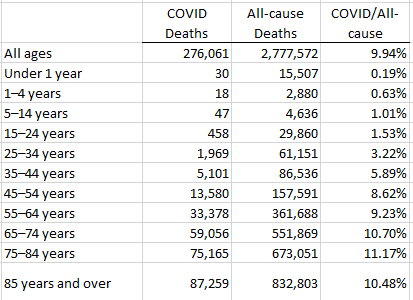I’m pretty sure the 1918 Spanish Flu was more likely to kill 20-40 year olds and young children. If covid was similar I have a really hard time imagining what the world would be like right now. I imagine empty cities and full lockdown, but maybe the rights brain rot is so severe things would mostly be the same.
I keep thinking back to this piece from several months ago from a doctor who said they’ve taken flu death estimates for granted in previous years and only this year did he and other doctors he talked to realize that they should be personally seeing more of them in the course of their practice if something like 60,000 people really die of it every year. When you count only confirmed flu cases the number was something like 9,000 to 15,000 per year over the past five or so. I don’t know if I got this article from UP but I don’t recall seeing much discussion of this topic.
Less than 9000 this year. Comparing flu to covid is ridiculous.
Thanks. It was dumb of me to bring in a flu comparison. I think the data on your link is still helpful to show why younger people might not be concerned about their risk of COVID:

If you’re a 25-34 year old, you could be thinking “I’m probably not going to die because I’m young. But even if I do end up dying somehow, there’s only a 3.22% chance it’s from COVID. So it’s obviously a low-likelihood outcome.”
That really starts ratcheting up in the next two age groups.
Meh, I’m being overly contrarian just to try to say “I understand why younger people might be acting selfishly if they only cared about their own risk of dying.”
If I were the only concern here I’m not sure what I’d do with the stat: on the chance I die in the next year there’s an 8.62% chance it will be from COVID. I’d probably do something about keeping my distance from people, but I wouldn’t be freaked out by that.
Ya I mean that’s kind of the point I was originally making. It is somewhat rational for young people to yolo it up until you factor in all the other people impacted. Also that graphic probably undercounts some because deaths from Covid are almost certainly undercounted. As we hit the 100k/month death rate over the next month or two that we all expect those percentages are going to skyrocket.
Covid is going to kill more Americans in a 12 month period (April-March 2021) than any event in US history. People don’t think about it like that but it’s reality.
I’m going to be the optimist and say that we don’t hit the estimated 1918 flu totals by the end of March (nominally, not population adjusted):
1918 flu: 675,000 deaths in the US
Current COVID deaths: 318,522 per Worldometers
Additional deaths through end of March: 309,000 assuming an average of 3,000 per day
(Obviously it is ghoulish to say that it’s optimistic to hope for another 309,000 deaths. I just meant I think I’m expecting fewer deaths than many in this thread.)
The 1918 pandemic lasted through 1920 so two years to hit that number right?
It’s a little ambiguous, but this timeline and this one make it seem like it’s very close to 1 year. At a minimum, the vast majority of deaths in the US seem to have occurred in 1 year.
You’d really need to adjust for the difference in population between 1918 and 2020.
Oh I agree with that. Population was like 35% of what it is now. On the flip side medical technology/knowledge is way better now so it is pretty hard to compare the two. I’m just saying this will likely be one of if not the deadliest things to ever happen here from a sheer numbers perspective and people DGAF. It’s wild.
This has been touched upon up thread but is it likely that the availability of vaccines may elevate the death numbers due to more unsafe behavior (before widespread vaccinations)?
If you estimate covid deaths using excess mortality we’ll zoom past 675 I think
I don’t think we can get much more unsafe than we are now, at least in the US.
a few deaths OH MY GOD NO LETS PREVENT THAT
a bunch of deaths I HAVE TO LIVE MY LIFE YOU CAN"T TELL ME WHAT TO DO FREEDUMBBBBB
Twitter hasn’t kicked Nick Fuentes off its site yet?
I’m rooting for some harsh side effects.